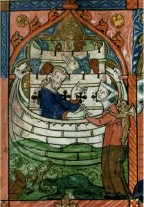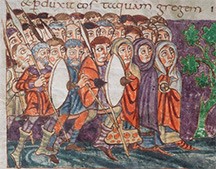MEDIEVAL STUDIES 490 Research Seminar in Medieval Studies (3 credits)
Although a specific MDVL 490 class is not offered in 2023W, seminars in other units may fulfill the Medieval 490-requirement for Medieval Studies Majors.
In 2023W, Medieval Majors may take HIST 490N Political Theology taught by Professor Courtney Booker.
Professor Sara Ann Knutson is the Medieval Studies advisor (sa.knutson@ubc.ca). As soon as you have enrolled in either seminar, email her so that she can edit your program in Degree Navigator accordingly to count it for the MDVL 490 requirement in the Medieval Studies Major.
(Double Majors in English and Medieval Studies may double count ENGL 490 or ENGL 491 for MDVL 490, if they are on appropriate medieval topics. Please consult the Medieval Studies Advisor.)
HIST 490N 101 Seminar for Majors in History (3 credits):
Political Theology Term 1: Thu. 2:00 – 4:00 pm
Prof. Courtney Booker, Department of History
Office: Buchanan Tower 1121
Phone: 604–822–5938
cbooker@mail.ubc.ca
In 2023W, the topic for HIST 490N is Political Theology. In this course, we will survey the late antique and early medieval writers and their texts that shaped western European ideas about politics and power, agency and institutions, nature and the supernatural, man and the devil. We will see how both holy scripture and the works of the church authorities who laid down its “correct” interpretation were received and put into practice. Along the way, we will test the validity of the famous dictum by the notorious twentieth-century political philosopher Carl Schmitt that “all significant concepts of the modern theory of the state are secularized theological concepts.”
ENGL 490 Literature Majors Seminar (3 credits):
Medieval English Drama: Mysteries and Moralities Term 1: Wed. 2:00 – 4:00 pm – not offered in 2023W
Prof. Leslie Arnovick, Department of English
Office: Buchanan Tower 201
Phone: 604–822–5509
leslie.arnovick@mail.ubc.ca
Plays like the “Second Shepherds’ Play” (shepherds greet a new baby who is really a sheep) and “Noah and the Ark” (a slapstick battle between Noah and his wife) are almost sacrilegiously funny. In fact, they were written by clergy and make serious points about God’s relationship with his people. Humor was often a vehicle for explaining the nature of free will and salvation, for the medieval church faced a real dilemma. How could they teach the people about the Bible and Christianity when church services – and the Bible – were in Latin, a language that most people did not understand? Even when, in the late middle ages, the Bible was translated into Middle English, it is uncertain how many average people were able to read Scripture. As a result, English drama plays a central role in religious education for the laity.

After reading a wide selection of dramas from the Corpus Christi Cycle (“Mystery Plays”) and the Morality plays in the first half of the course, each student will select an individual play for further analysis. In the second half of the course, each student will present individual research to the seminar.
While knowledge of Middle English (ME) would be ideal, a willingness to immerse oneself in this late medieval language (practically Early Modern English) is all that is necessary. Texts are given modern spellings (and glossed), while explanatory notes are provided in the edition ordered for class.
.If you are not an English Major, contact Professor Arnovick if you are interested in this course. She welcomes Medieval Studies students, but must give priority to English Majors. If there is space – that is, if the English department enrolls fewer than 16 students – she will have you enrolled in the course.
* If you are interested in the topic, but can’t register for this course, or prefer not to take it as a seminar, Professor Arovick’s lecture course deals with Medieval Mystery Plays: ENGL 344 Medieval Studies: The Bible on Stage. See description on page 11.
_____________________________________________________________________________________________________________
MEDIEVAL STUDIES 449 Graduating Essay or Supervised Study (6/12 credits)
This course is available any year for independent study to write a lengthy paper based on original research. It is possible that these credits might be combined with another medieval course so that more systematic and intensive work might be undertaken under the supervision of a Medieval Studies faculty member. If no MDVL 490 course is available, three of these credits may fulfill the MDVL 490 requirement. For further information, consult the Medieval Studies advisor.
